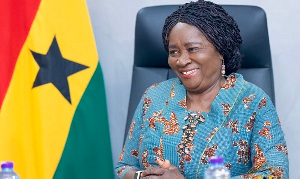-towards food security in Ghana
A GNA Feature by Albert Oppong Ansah
Tamale, April 18, GNA- Many countries are resorting to modern technologies and processes to enhance farm operations to ensure that the ever growing population have access to quality food at all times. The global food crisis caused primarily by drought, rising energy and production costs, population growth, rising demand for bio fuels and meat in China and India clearly show that humans are vulnerable to these factors that inhibit food production.
The impact is serious for both the urban poor in developing countries and for the poorest of rural dwellers who must buy much of their food.
The food crisis also highlights the worldwide challenges of food insecurity and poverty alleviation, resulting in numerous calls for immediate and focused action to help the world's poorest people 96 most of whom are rural and to increase efforts to achieve the Millennium Development Goals (MDGs).
The United Nations identified eight MDGs to ignite global development. The current crisis especially emphasizes the need to achieve MDG 1: Eradication of extreme hunger and poverty by 2015. As a result, agriculture has now become a development priority given that it is the mainstay of the economies and employment in most developing countries.
Despite all efforts at addressing food security challenges, many developing countries seem not to make any headway. According to the World Food Summit of 1996, food security means: 93when all people at all times have access to sufficient, safe, nutritious food to maintain a healthy and active life". Commonly, the concept of food security is encompasses both physical and economic access to food that meet people's dietary needs as well as their food preferences.
In many developing countries, lack of food had resulted in health problems related to dietary problems and the ever increasing threat of malnutrition, poverty, hunger and food-borne diarrhoea which have become a burden.
A Development Planner, Mr Nyaaba-Aweeba Azongo,=A0in an interview with Ghana News Agency, said the 93copy past" technologies by developed countries on farming would not help developing countries in their quest to attain food security. He said the only way developing countries could address the challenges associated with food insecurity was to come out with Home-Grown Mass-Scale planning model for a sustainable solution to=A0economic development.
"We the indigenous people of developing countries need to devise our own means to solve our problems since most of the solutions to these challenges reside within ourselves, in our local areas," he said.
In Ghana, successive governments and international agencies had embarked on many projects including Block Farm Projects, National Youth in Agriculture among others to ensure that the nation's agriculture received a boost, ensure food security and meet the MDG goal one by 2015.
Dr. Kofi Debrah, the Country Representative of IFDC in Ghana, in an interview with GNA said most agricultural development projects in Ghana focus on the supply side to increase productivity through better farm practices and more efficient use of agri-inputs but few address the demand side to ensure that increased production finds its way to market without adversely affecting prices or farmer incomes.
=A0 In Ghana, recent efforts by the private sector and international donor organizations, non-governmental organizations (NGOs) and relief agencies are beginning to address these marketing output issues towards facilitating food security by the government.
The majority of these initiatives assist farmers in holding their post-harvest grains in professionally or farmer-managed storage facilities 96 releasing outputs to the market only when the prices are optimal.
Other projects are designed specifically to ensure that yield-increasing farmer support is accompanied by targeted efforts to link these farmers to buyers. Although these efforts to build linkages have increased the stability of segments of various agricultural value chains, greater effort is needed to create sustainable progress in an uninterrupted, fully functional and farmer-friendly agricultural supply system.
The project, "Linking Farmers to Markets (FTM)", he said, is designed specifically to deal with the issue of poor farmer-to-market linkages. Through the FTM project, IFDC is increasing farmers' incomes and long-term business opportunities by developing new commercial linkages with traders, marketing companies, processors and institutional buyers.
This effort was developed to address every point along the value chain, ensuring that no part of the chain is allowed to interrupt the profitable flow of produce from farmers to their markets. =A0 By the end of the FTM three-year term (2010-2013), the project would have affected approximately 50,000 smallholders' livelihoods by creating farmer alliances, training and equipping small-to-medium-sized enterprises and building lasting relationships with national, regional and international produce-purchasing companies.
The project is=A0being funded by the=A0Alliance for a Green Revolution in Africa (AGRA)=A0and partners with the Savanna Farmers Marketing Company Ltd. (SFMC), a farmer-owned company, serving as a "Special Purpose Vehicle" and aggregates participating farmers' produce to supply large industrial buyers.
Between 2005 and 2008, SFMC assisted about 5,000 smallholder farmers in the three Northern regions of Ghana to sell a total of 4,300 metric tons of sorghum, soybeans and cashew valued at US $1.4 million.
=A0 The training, mentoring and equipping SFMC to provide substantially increased business and marketing services to a larger number of smallholders who will supply produce to industrial buyers through SFMC.
The project's results directly benefit smallholder farmers, buyers and consumers. By linking with buyers before production begins, farmers have greater opportunities to work within ensured market environments, and may often engage in pre-negotiated price agreements. These mutually assured benefits-based relationships are the cornerstone of the project 96 protecting the interests of all actors along the value chain specifically, the local farmers.
Utilizing this methodology, traders, processors, agri-food industries and large retailers can obtain reliable, regular supplies with greater control over the quantity and quality of the products they purchase=96all while continuing to motivate farmers through fair and consistent purchase pricing.
Dr Debrah said farmers go through a lot of challenges for which they cannot be blamed because they find themselves in an information vacuum not knowing; how much to produce, who would buy, for how much and when their produce would be bought. 93Similarly seed, fertilizer and other agro-chemical sellers are not sure of the type and how much wares to stock. This is so because they do not know how much of what product would be needed and at what period.
"Aggregators may have fixed supply contracts to deliver (a given quantity and a given date) but are unsure how to get produce of uniform quality. The industrial buyer is unsure of how much raw material he can procure domestically thus affecting import plans. This calls for a way to link all such actors so that they can communicate seamlessly and in real time to take relevant decisions."
Dr Debrah noted that many of the partners in the value chain including the farmers, had cell phones and therefore could transform these phones into business tools, rather than for social communication. 93We have introduced a system, where we design an electronic data-base of various participants in the value-chain and the linkage activities among the various players is anchored through mobile telephony," he said.
He described the 91mFarms' platform, as an information exchange tool, a decision support tool and a planning, production and marketing tool.
Dr Debrah explained that the mFarms platform is an information-sharing application developed by Imagead, an Accra based software-developing company. It helps farmers, agro dealers, aggregators and the transport sector to get to know at every point in time, which group of farmers were cultivating what kind of crop, at which location area, the quantity to enable aggregators instruct the trucks to transport the farm produce after harvest.
"For instance, with the use of a mobile phone, a farmer can purchase agro farm inputs and chemicals for the farm, in the same vein, an aggregator will be able to know that he or she can buy maize or soybean from a farmer of choice at location because the platform allows the aggregator to put farmers who cultivate various crops into specific groups.
"After the aggregator having access to this information, he or she then links up a transport company to convey the goods from the farm to the end buyer," he said.
Dr Debrah indicated that the project hopes to increase the income of about 50,000 farmers from the three Northern regions of Ghana by 15-20 per cent through the production and regular supply of high quality rice, maize, soybeans and sorghum.
On the benefit of the initiative, he said, SFMC and local entrepreneurs supported by the project would also increase their profitability by up to 30 per cent by providing business services and aggregating quality produce for buyers.
It would aid participating agro-industries to obtain between 60-75 per cent of their raw materials from farmers supported by the project.
"Participating farmers will reduce transaction costs by 30 per cent through collective action and increased linkages with buyers. "Our expectation is that the consumption of locally produced rice will increase by 20 per cent. Access to financing sources will increase for farmers, marketing companies and local entrepreneurs," he said. Ms. Gina Odartefio, Chief Executive of Amsig Resource, a food supply firm, who is a beneficiary of the initiative, told the Ghana News Agency that with the innovation, there would be no need to physically meet with farmers to have a fair idea of what type of crop they would cultivate in a season as well as the quantity and when it was expected to be harvested.
"This will also support our surveillance mechanism because during the training and the practicals, I gathered that for instance, our staff who will be detailed to take records of farmers in at their farm gates can no longer give wrong information because the system will indicate the specific location from where the information is being sent," she said.
Ms Odartefio added that the system could easily be used to send information to transport partners to carry goods to the required destination.
Mr Kwesi Ahwoi, the Minister of Food and Agriculture, in a statement delivered on his behalf at a stakeholders forum on Agriculture, said government in collaboration with AGRA and other international institutions was to start a programme called Breadbasket Strategy.
The initiatives seeks to accelerate and increase productivity and food security, ensure focused investments in high potential areas that are ripe for agricultural development as well as a way of operationalizing the Medium Term Agriculture Sector Investment Plan. He said certain areas had been mapped as the breadbasket areas in Ghana; Northern, Accra Plains, Afram Plains in the Eastern Region and=85..where farmers will be provided with the necessary support including agro chemicals, farm implements, storage facilities and certified seeds all in a bid to increase crop yield and reduce food imports in the country."
The aim, he said, was to bring change in the agriculture sector and to complement government's already existing programmes. Mr Andre Bationo, a representative of AGRA, said in Ghana, Green Revolution had implemented projects aimed at supporting farmers with inputs and agro chemicals.
He mentioned Ghana Agro-Dealer Development Project, which is aimed at supporting about 2,200 agro dealers and 150 seed producers to ensure increased productivity, incomes and well-being of about 850,000 smallholder farmers.
Dr Bationo said the interventions by AGRA particularly to link farmers to the market, would help to remove the frustrations farmers go through in selling their produce and boost their desire to produce more to meet the country's food needs. With these interventions, it hoped that the government and people of Ghana would be able address the problem of abject poverty in the land and other related developmental challenges particularly malnutrition especially in the Northern Region.
Opinions of Sunday, 24 April 2011
Columnist: GNA














